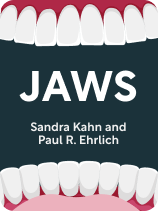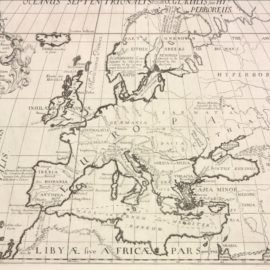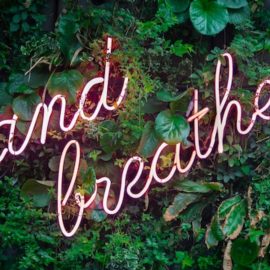

This article is an excerpt from the Shortform book guide to "Jaws" by Sandra Kahn and Paul R. Ehrlich. Shortform has the world's best summaries and analyses of books you should be reading.
Like this article? Sign up for a free trial here.
How did ancient humans, with no toothbrushes, have better oral hygiene? How are we hindering our jaw development with modern diets?
In the book Jaws, Sandra Kahn and Paul R. Ehrlich explain that our ancestors tended to have healthier mouths than we have now, even though they didn’t have dentists or toothbrushes. This is due to a number of factors, including our modern diet.
Here’s a look at the history of oral hygiene, including how ancient humans maintained their oral health by simply using their jaws as they were meant to be used.
Our Jaws Evolved for Heavy Use
In a discussion about the history of oral hygiene, the authors explain that ancient humans used their teeth for serious labor, such as tearing raw meat and grinding up uncooked vegetables. This intensive use caused them to develop strong jaw muscles and teeth, which naturally protected them from many of the dental problems we have today.
For instance, skeletons show that ancient humans wouldn’t have needed braces even if they could have made them, because their teeth naturally grew straight. They also wouldn’t have needed their wisdom teeth pulled, because their jaws were large enough to accommodate all of them this way—for example, think about how soft a cooked carrot is compared to a raw one.
These ready-to-eat foods mean our jaws don’t get the kind of exercise they’re evolutionarily designed for. As a result, many people today have underdeveloped or deformed jaws that can’t comfortably hold all their teeth, which causes teeth to come in crooked, out of place, or painfully crowded against each other. This is why braces and wisdom tooth extractions are so common now.
Furthermore, the authors say that our modern diet affects the type of bacteria that live in our mouths. Because we eat a lot of sugars and carbohydrates, different types of bacteria now thrive there, and those new bacteria happen to be types that promote tooth decay. This is another reason ancient humans had such good oral health, despite not having access to toothbrushes or dentists. their teeth. By contrast, both braces and extractions are common in modern society.
(Shortform note: While ancient humans lacked modern oral hygiene tools like toothbrushes and lacked access to professional dental care, they had other methods for keeping their teeth clean. Their diet, which was high in fibrous plants and tough, chewy foods like roots, nuts, and meat, required vigorous chewing. This chewing action helped scrub away plaque and debris from teeth. Additionally, many ancient cultures used sticks as rudimentary toothpicks or chewed on abrasive plant materials like frayed bark or grass stems to further clean their teeth.)
As further evidence for their claims, the authors say that animals show a similar pattern: Wild animals, whose food is harder to chew, typically have better oral health than domesticated animals. For example, a wild dog living on raw meat is likely to have stronger teeth than a pet dog who eats processed kibble and canned food. (Shortform note: The claim that wild animals have healthier mouths than domesticated animals is somewhat controversial. For instance, one study of African wild dogs found that they suffered from oral diseases at roughly the same rate as their domesticated counterparts, which suggests that diet alone isn’t enough to prevent such problems.)
Why Modern Diets Harm Our Jaws
Kahn and Ehrlich explain how modern lifestyles have drastically impacted jaw development and say that the main cause is our increasingly soft diet. Processed foods, along with technologies like blenders and food processors, mean that much of our food arrives “pre-chewed”: already partially broken down so it’s easier to eat and digest. Even cooking food starts to break it down in this way—for example, think about how soft a cooked carrot is compared to a raw one.
These ready-to-eat foods mean our jaws don’t get the kind of exercise they’re evolutionarily designed for. As a result, many people today have underdeveloped or deformed jaws that can’t comfortably hold all their teeth, which causes teeth to come in crooked, out of place, or painfully crowded against each other. This is why braces and wisdom tooth extractions are so common now.
Furthermore, the authors say that our modern diet affects the type of bacteria that live in our mouths. Because we eat a lot of sugars and carbohydrates, different types of bacteria now thrive there, and those new bacteria happen to be types that promote tooth decay. This is another reason ancient humans had such good oral health, despite not having access to toothbrushes or dentists.
| Human Ingenuity Often Causes New Problems Modern diets, and the harm they’re causing to people’s jaws and teeth, are one example of how human intervention tends to create new problems while trying to solve existing problems. In this case, making food cheaper, tastier, and easier to eat had the unintended side effect of stunting people’s jaw growth. In Antifragile, risk analyst Nassim Nicholas Taleb refers to this phenomenon as iatrogenics. While that word technically means unintended harm from medical treatments—such as patients getting addicted to prescription painkillers—Taleb expands it to include unintended harm from any human intervention in natural processes. Furthermore, Taleb asserts that people usually cause more harm than good when they interfere with nature, yet humanity still insists on trying to improve things that don’t need to be improved. He says there are two reasons for this: First, people feel the need to act. Even when we know something will be fine if we leave it alone, we simply can’t resist the urge to try to make things better (such as our food). Second, people mistake a lack of evidence for evidence. In other words, if nothing bad has happened yet, people assume that nothing bad will ever happen. For example, adding lead to gasoline improves engine efficiency and vehicle performance. Since there were no immediate negative effects from doing so, leaded gasoline became the standard all over the world starting in the 1920s. It took decades for people to realize that leaded gas was causing serious harm, and as a result, hundreds of millions of people are now suffering from lead poisoning. |

———End of Preview———
Like what you just read? Read the rest of the world's best book summary and analysis of Sandra Kahn and Paul R. Ehrlich's "Jaws" at Shortform.
Here's what you'll find in our full Jaws summary:
- How our modern lifestyle has created a hidden epidemic of jaw deformities
- How a decrease in average jaw size is contributing to health problems
- Three ways to prevent or correct jaw deformities






